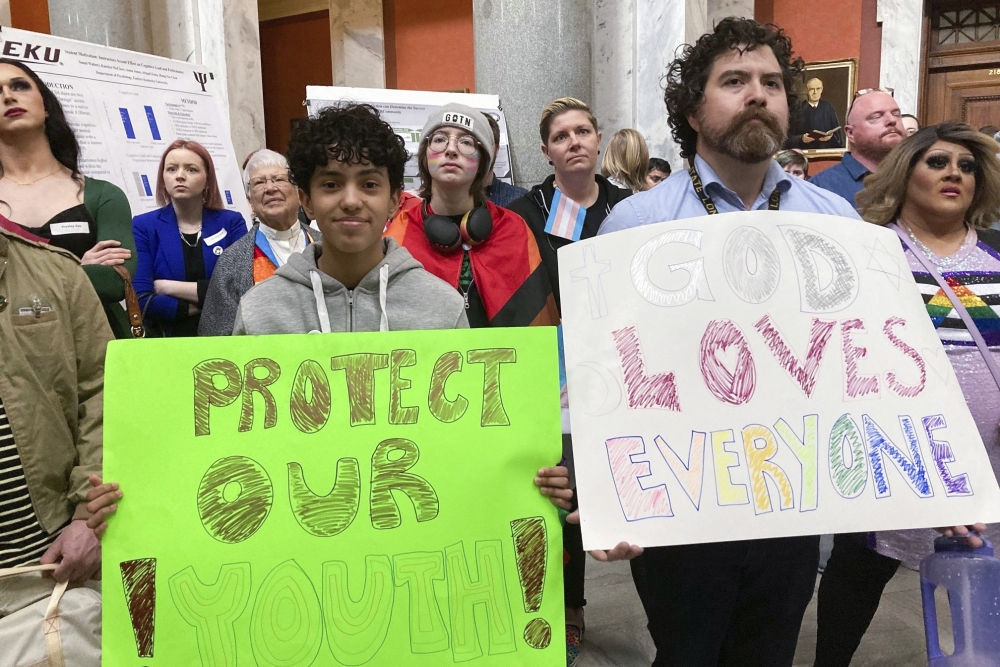Rev. Marvin M. Ellison, Ph.D., is the Willard S. Bass Professor Emeritus of Christian Ethics at Bangor Theological Seminary.
As a Christian ethicist who’s written extensively about shifting attitudes toward gender, sexuality and cultural change, my heart sank while reading a Sept. 10 letter to the editor (“Gender ideology does not belong in Maine schools).
In lamenting the very “idea” of transgender persons as “complete BS,” the writer indulges in what philosopher Jean-Paul Sartre identified as a frequent precursor to moral evil: “treating the concrete as abstract.” In other words, we cause harm when we deny other persons their humanity and objectify them as not-quite-human or, worse, as things.
Granted, many conservative Christians insist that the Bible endorses a strict gender binary as normative. Genesis 1:27 states, “God created them male and female; male and female God created them.”
Any departure from this binary, it is claimed, is a sign of human sinfulness, of godlessness. Moreover, transgender people don’t exist and can’t really exist because the Bible says that God created two and only two sexes.
As in so many things, the problem here may not be with the Bible, but with the readers of the Bible who come to the text with certain assumptions. Consider how the Genesis creation story makes use of a rhetorical device called a merism, in which a whole is alluded to by some of its parts.
The biblical text says, for example, that God created day and night: “There was evening, and there was morning, the first day.” The phrase “evening and morning” is an example of a merism, in that evening and morning are parts representing a larger whole. The phrase “evening and morning” incorporates not only the evening and the morning, but also dawn and dusk, late morning and early afternoon although, to be sure, only evening and morning are explicitly mentioned.
However, mentioning two and only two elements does not preclude other elements, right? The two parts mentioned — “evening and morning” — encompass all the other parts of the
day.
Similarly, the phrase “male and female” does not limit creation to only these possibilities. Rather the phrase “male and female” points to a broader spectrum of gender identities, each of which God pronounces as good, indeed, as very good.
Moreover, because God created humanity in God’s own image, might it not also be wise to reimagine God as the transgender or gender-nonconforming God? Along these lines, poet and theologian Virginia Mollencott speaks of the “omnigender” God, the God of all genders and of none.
In the Christian faith tradition, a perennial moral question is always “Who is my neighbor?” Who is the one whose fundamental rights we’re obligated to protect and uphold: their right to be, their right to love and be loved and their right to safety, security and dignity as respected members of the community?
A second, related question is “Who is the one who proves to be neighborly by their actions, especially their solidarity with the marginalized and culturally despised?”
The letter asserts that “Donald Trump is right,” that “today’s gender ideology has produced an epidemic that is infecting our youth.” I see things differently.
Educating youth about various kinds of difference is not “complete BS,” but rather a necessary means to prepare and equip citizens and neighbors to share and, when all goes well, enjoy life together in an increasingly pluralistic society.
The problem is not “them,” but us. What I find so grievous, and what we should all lament, is how rising authoritarianism in the U.S. has precipitated a kind of moral coarsening that foments widespread societal disdain, even hatred, toward those who are weak and vulnerable.
Sadly, that has caused most harm to the “strangers” among us, including immigrants, the homeless, women seeking abortion care and, yes, transgender people.
The remedy for our ills lies not in purging society of so-called misfits, but rather in drawing the circle wider, welcoming all as beloved members the community, and insisting that no one is unimportant or disposable, no not one.
As Jesus observed, “By their actions you will know them.”

We invite you to add your comments. We encourage a thoughtful exchange of ideas and information on this website. By joining the conversation, you are agreeing to our commenting policy and terms of use. More information is found on our FAQs. You can modify your screen name here.
Comments are managed by our staff during regular business hours Monday through Friday as well as limited hours on Saturday and Sunday. Comments held for moderation outside of those hours may take longer to approve.
Join the Conversation
Please sign into your CentralMaine.com account to participate in conversations below. If you do not have an account, you can register or subscribe. Questions? Please see our FAQs.